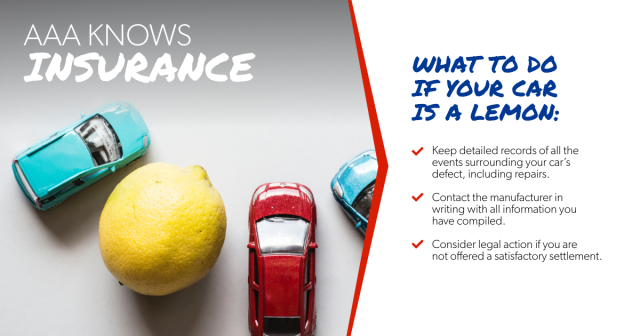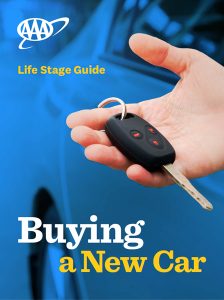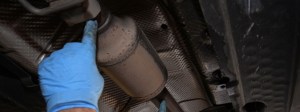Getting behind the wheel of a is always an exciting experience, but that new car smell can’t mask any major defects the vehicle may have. If you find your vehicle has a significant problem that cannot be fixed, you may have a lemon. But lemon laws can be confusing and are different in every state. To help navigate you through the process, here is a step-by-step guide on what to do if your car is a lemon.
What Is a Lemon?
Lemons are cars that have manufacturing problems or defects that substantially impair their use, value or safety and cannot be fixed after a reasonable number of repair attempts. “Substantial” impairment means the issue must affect a vehicle’s use or safety on the road. (A damaged air conditioner would not fall under lemon law protection, faulty brakes would.) The damage also must be a manufacturer default and not the result of a driver’s use or abuse of the vehicle.
Each state has their own standards for qualifying lemon cars. In most states, the lemon law only applies to new cars, but some states allow used cars to be qualified as well. Certain states have specific requirements for how old a car can be or how many miles it’s been driven. Others will specify the minimum number of repair attempts needed. Each state’s lemon law statutes can be found on the Better Business Bureau website.
You can also do research to determine if other drivers have had problems with the same car model as you and if there have been any recalls on the vehicle. The National Highway Traffic and Safety Administration records all complaints, investigations and recalls for a specific model. The status of your personal car can be checked by entering its unique vehicle identification number. The NHTSA site will inform you if your car has any recall defects that have not been repaired.
You can also check AAA.com for all the latest information on vehicle recalls.
What to Do if Your Car Is a Lemon
Gather Records
If you believe your vehicle classifies as a lemon, it is critical that you keep detailed records of all the events surrounding your car’s defect. Should you need to go to court over your case, this is the only way to prove that you have tried to get your vehicle fixed. Documentation should include records of repair attempts, dates of when issues with the car arose and any correspondence with the manufacturer or dealer.
Contact Manufacturer
The first step in getting your refund is contacting the manufacturer in writing. Make sure to include all the information you have compiled as well as a timeline of events including when you bought your car, when the problems arose, when you informed the dealer of the problem, when you took it to them for repairs and the result. You can find template letters online, such as this one from Consumer Affairs.
Go to Arbitration
If you are not offered a settlement you find satisfactory, you will have to take legal action. Most states require that lemon law cases go to arbitration before they reach the court system. You can file and go through arbitration on your own, but you may still want to hire an attorney. Manufacturers employ teams of attorneys that deal with lemon law cases regularly, so it can help to have a professional on your side. Additionally, if you win your case, the manufacturer is liable for your attorney fees.
In arbitration, you and the manufacturer present evidence about the condition of the vehicle to an impartial person (the arbitrator). If the arbitrator agrees that your vehicle is a lemon, you will be awarded a replacement vehicle or full refund (minus the use allowance and the amount of any previous settlement from the manufacturer). However, if the arbitrator rules against you, there will be no award. Arbitration rulings are final, but most states allow either party to appeal the decision. An appeal would push the case to court, where it will now be decided by a judge using the same arguments made in arbitration.

Preventing a Lemon Car Purchase
Of course, the best way of avoiding the arduous task of getting a lemon car refund is never having a lemon car in the first place. The catch is that you will rarely ever know you have a lemon until after you purchase it. So how do you prevent it?
If you are purchasing a new vehicle, you want to make sure the car wasn’t subjected to a recall. Federal law prohibits selling a new car that is under a recall and has not been fixed. That doesn’t mean it can’t happen though. Make sure to look up the make and model on the NHTSA website, and if it was recalled, have the dealership prove that the problem was fixed.
Unfortunately, used cars can be sold while under a current recall. There also may be past recalls on the car that was never addressed. When buying a used car, enter the car’s VIN number to see if all past and present damages have been corrected. You should also research the car’s history report using a service such as CARFAX. These reports will provide not only recall information but any major accidents, structural damage, service history, and, most importantly, if the car was ever labeled a lemon.
The AAA Auto Buying Program is also a good resource for finding and purchasing a vehicle. Learn more.
If you feel confident in the vehicle, you’ll still want to take all the usual car-buying steps. This includes inspecting the interior and exterior of the car, test driving it on both local roads and highways, and taking it to a third-party mechanic for inspection.
Whether your car turns out to be a lemon or not, you’ll always need to protect it. To learn more about AAA auto insurance, get a quote or contact an agent, visit AAA.com/Insurance.
10 Thoughts on “What to Do If Your Car Is a Lemon”
Leave A Comment
Comments are subject to moderation and may or may not be published at the editor’s discretion. Only comments that are relevant to the article and add value to the Your AAA community will be considered. Comments may be edited for clarity and length.



















Lovely article! I’ve learned so many things from your content. My wife took the van to a local tire dealer to have the tire replaced, turns out we had to replace both rear tires because they were dry rotted from sitting, this was about 3 days after purchase. Also were took the vehicle on a cursory test drive around the block, with no issues. Will love to visit again for so much new information. Keep going
thank you Audrey, we aim to please!
Hello,
My daughter purchased a used 2014 Honda CRV from a small dealer. When it was due for oil change so took it in and noticed old paper work inside glove compartment inside car. She noticed miles from last time car was serviced were in the upper 200,000+ but when she bought the car it had under 80,000 miles on it. She quickly brought that to the attention of the dealer and he told her mileage reader must be broken and if she wants can exchange car to a different one. She opted to change the car to a bigger one and was told he would have the replacement in a couple of weeks. It’s going on over 6 months now. What can we do?
Hi, thanks for the question. Here’s an answer from our Car Doctor John Paul: My first question would be the verify the actual milage. A Honda dealer should be able to run the service records and see when it was in for service. Also at this point the dealer should pay for a Car Fax report to get a bit more history on the car. You may find someone was just not accurate with mileage when filling out paperwork.
If the vehicle does have 200,000 miles on it and they sold it with 80,000 miles it is fraud. Used cars are in short supply but they owe you a vehicle or a full refund since they sold you a car with misrepresented mileage. If this was my situation, I would start with calling the dealer regularly and also find something that would work for you. Use websites like Carvana, iseecars.com and cargurus and find a car that works and tell them here is something that would work—get me that one. At the very least they owe you a 2014 CR-V with 80,000 miles on it. If not, then you may need legal representation.
I forgot to mention the vehicle was purchased in Oak Ridge, TN.
What recourse does a person have if the dealer in question sold the vehicle knowing the vehicle had mechanical and safety defects? I bought a Dodge Van shortly are buying the vehicle the right rear tire lost a large piece of the thread. My wife took the van to a locale tire dealer to have the tire replaced, turns out we had to replace both rear tires because they were dry rotted from sitting, this was about 3 days after purchase. Also were took the vehicle on a cursory test drive around the block, no issues; on the way home the vehicle developed a miss in the engine which is costing use $ 682.00 to have repaired. My complaint is that the dealer told us that all of the vehicles they sold went through a 167 point pre-sale inspection that if not passed the vehicle would not be sold. Also we found the motor oil a quart low and the transmission fluid a pint or quart low.
Hi Dan, thanks for the question! Here’s some advice from our Car Doctor John Paul: There are consumer laws that are there to help. The issue is that the laws vary from state to state. In Massachusetts, where I live, the car needs to pass the state safety and emissions inspection. That test needs to be performed within 7 days. If it doesn’t pass the car needs to be repair. In addition, most cars have a 30,60 or 90 day warranty (high mileage vehicles are exempt). In other states vehicles can be sold as is and have no warranty. Since the dealer told you they put the car through some comprehensive inspection (which from your description they didn’t), then small claims court could be an option.
My friends has a Volvo XC90 she bought used from a Volvo dealership in Rhode Island . She also paid for an extended warranty for 7 yrs 100,000 miles. The car now (since she bought it ) is 5 yrs old , however the car is actually 7 yrs old it’s a 2013 she bought it in 2015, and it has 93000 miles on it . The cat won’t run and the dealer says that the extended warranty is over, because the warranty started when the car was new and first in-serviced . Not sure how that can be cause she bought it when it was 2 yrs old and paid $2500.00 for an extended warranty. So how could the NEW extended warranty start when the car was first inserviced . That means she got ripped off 2 yrs off her warranty. What do you think?
My 2014 Honda Accord transmission failed with 48k miles it was rebuilt at Honda for my warranty for 50k plus I have an additional 100,000 miles 7 years extended warranty, at 75,100 miles the transmission broke again even causing a hole to get punch out from inside out spilling transmission fluid all over the street . It’s back at Nardy Honda in Smithtown NY . Am I covered for any Lemon Law or should Honda at the least extend my 100,000 warranty
Hi Eric, here is a response from our Car Doctor John Paul: Hello. Your car would not be covered by New York Lemon law. Lemon law covers cars for two years or 18,000 miles which ever comes first. Honda’s legal obligation is to provide warranty coverage to the limits of the warranty which is 5 years or 60,000 miles which ever comes first. Fortunately you have an extended service contract that should cover the cost of the replacement transmission.
Honda has no legal obligation to provide any warranty coverage beyond the 5/60,000 miles. Could Honda, in the spirit of customer “good-will” offer to extend the warranty, in my opinion/experience this is unlikely.